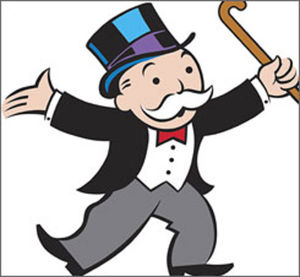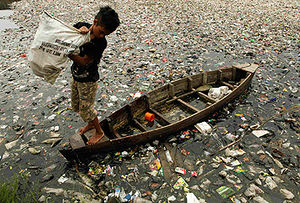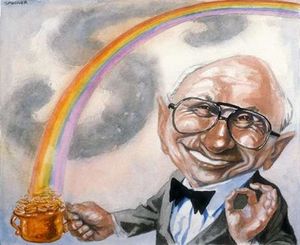Ethical trading
Ethical trading is a social and economic philosophy about investing and trading with companies which analyze, report on and therefore heavily influence the trading behaviour of investors and indirectly the practices of companies. Ethical investing attempts to find a balance between a need to invest and therefore allow a company to grow and be profitable as well as behave ethically towards the society where it carries out its business therefore winning the hearts of opportunistic capitalist vultures and the souls of cappucino slurping do-gooders.
History[edit | edit source]
| Economics |
|---|
 |
| Ideologies |
| Theories |
There has always been a silent war between those who try to maximize their profits by any means possible and those who believe that business practices negatively affect their standard of living and thus fight against those who invest by any means possible. Such activists have been known to protest with signs in the street, scream and yell during rallies, put on cross dressing outfits and bash in window fronts of successful businesses and find other various ways to fill up their unemployed days. In the past this was more of a nuisance than a real threat to traders however with the advent of professional activism this has become a larger hindrance to investors contributing to society and trying to lead a reasonable standard of living.
Ethical Trade Foundations[edit | edit source]
In 1999 a Chicago based company started the Ethical Trade foundation group designed to help investors find companies that supported only highly philosophical and humanistic trading purposes. Their portfolio selection method included a simple yet highly effective way to find companies compatible with the need of world development. They would only recommend clients invest in companies if the company:
Utilized Resources to the Maximum possible: Companies that continued to let people make things instead of machines were highly unethical in that they wasted use of energy and time productivity by letting people sweat over the production of things when machines could make so much more so much faster. Companies that insisted on employing humans over machines were discredited as highly unethical.
Using the environment sustainably: Companies that left trees standing where factories could be built or made artificial sewers where natures natural river basins allowed unneeded production output to wash into oceans and disperse into the natural purification system where also passed on investment. Insisting on losing opportunities such companies were deemed highly wasteful and disrespectful of the environment given to us. We only have one chance to use the environment and thus investing well in it was being ethical to not just one area but to man kind in general.
Treating management well: Human beings need rest, a broader education, stress relieving activities and a chance to develop themselves and eat well. It was noticed in the early 2000's that many hard working CEO's were given paltry bonuses and meager working benefits and it was then considered important to enhance their working style. Meals without champagne were dropped, companies without executive gyms were remodeled and golf weekends to allow work mingling and relaxation were increased from twice to five times a month (if possible). Even during the economic crisis companies still managed to find a way to reward their hard working CEO's by ethically rewarding them for maximizing opportunities and returns, the hall mark of a fair and just system. Only companies who responsibly do so are invested in.
Charitable investments: Investing in the wasteful and unpleasant social work (which business would do much more efficiently if paid so by the government) is seen as a way to improve their images amongst unemployed and wasteful voters. By choosing the right charities and limiting the amount donated by maximizing the good image created, companies therefore increase the opportunities to invest, develop and maximize the return for their companies and therefore society. Thus, ethical traders only invest in companies which choose the right charities to invest in and who more importantly invest the right amount.
Reagan[edit | edit source]
Ronald Reagan during his two terms as president opened the eyes of the financial world by showing that an opportunity taken is an opportunity gained and therefore an opportunity not lost. By this he probably meant that sitting around playing super Nintendo all day (yes remember how long ago that was), or letting bong smokers stop cocain driven "doers" was letting America and its economy stagnate and dry up affecting all people and in its trickle effect destroying the world. Thus finding new markets and economies (it was discovered that oil floated around in a small African Island at just that time) and investing in such promises (negotiating with the President of the nation and coming to a fair economic agreement) America's hard earned capital could be used to grow the American economy and help out a poor African island. Just at this time activism by unemployed and sex crazed youth started on socialist campuses of public universities. Complaining that Reagan's politics led to companies where "prowling" for new opportunities and "invading local markets" for some reason seduced the minds even of young rich boys, children of prominent families. Even though these companies brought great return on capital to the American economy and raised the standard of living by 10% a year (their incomes rose from $0.50 a day to $0.55 almost over night over the period of four fiscal quarters) and two roads from the shipping port to the oil fields (which allowed two restaurants to open on the island within six months) spoiled and impressionable young minds failed to see the win win situation of emerging markets.
Responsible trade[edit | edit source]
It was around this point that Milton Friedman penned the term (which haunts us to this day) that greed is good for all. While this is true, the real power behind trade was that investment and return is good for all. Maximizing ones opportunities and flow to investment and return can only maximize the benefits for all. Impeding this by local and subjective barriers such as local and cultural needs (i.e. the right to not make .05c more a day and the right not to have two new roads in your country), or environmental concerns (this notion that a dead fish in a river near a factory means the world will implode tomorrow) can only bring us back to a time when landlords were forced to execute people for starting nonsensical riots and time wasting protests. It seemed young people were intent on throwing the world back to a savage and brutal time.
Future[edit | edit source]
The future of ethical investment is shaky. As current governments in the world insist on making laws impeding ethical investment, new groups which create just portfolios and create an investment regime to stand for fair investing by leading by example, investors in the future will have far better options to contribute to the economy and make the world a much better place, one new executive bonus and charitable donation cut at a time.




